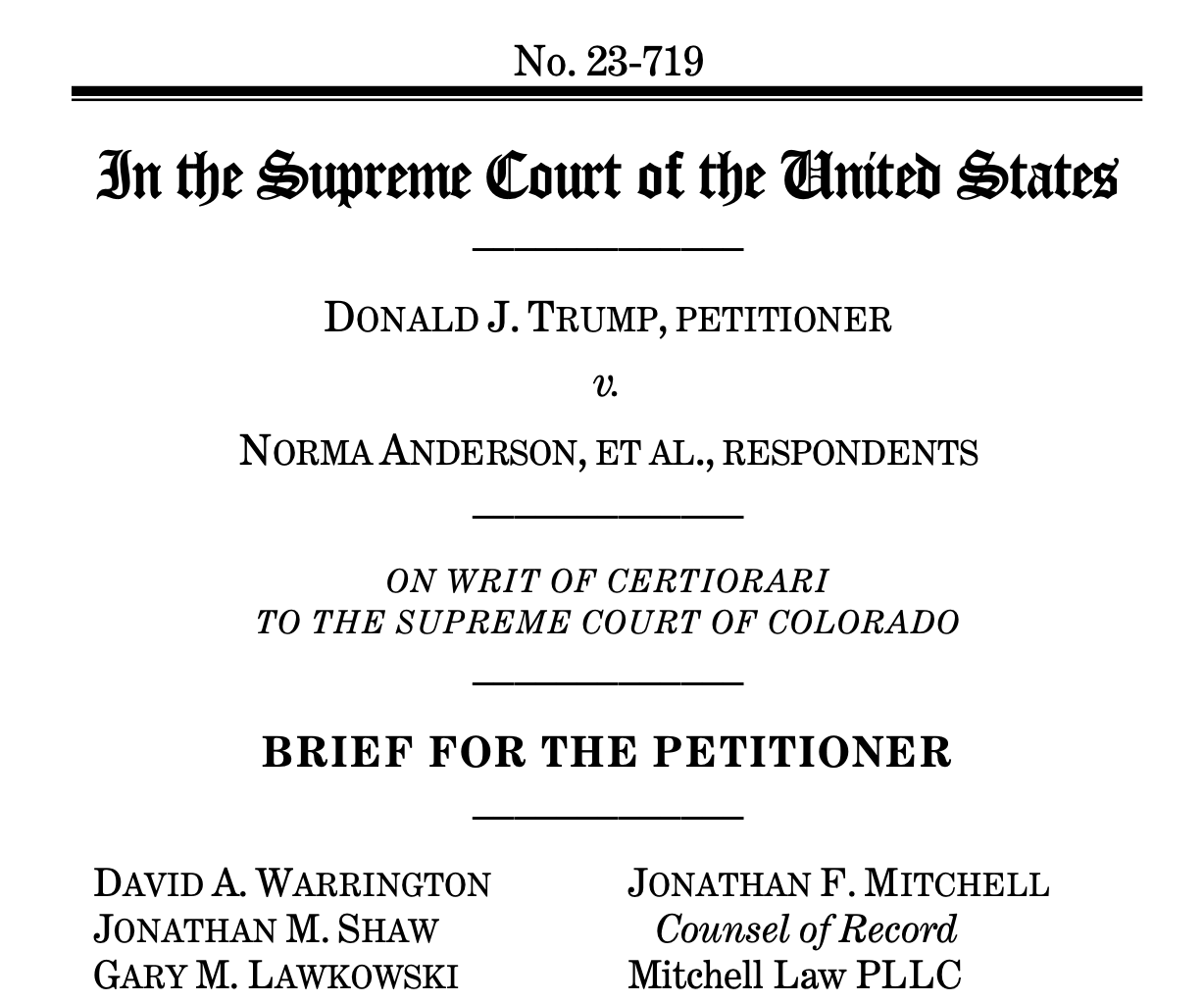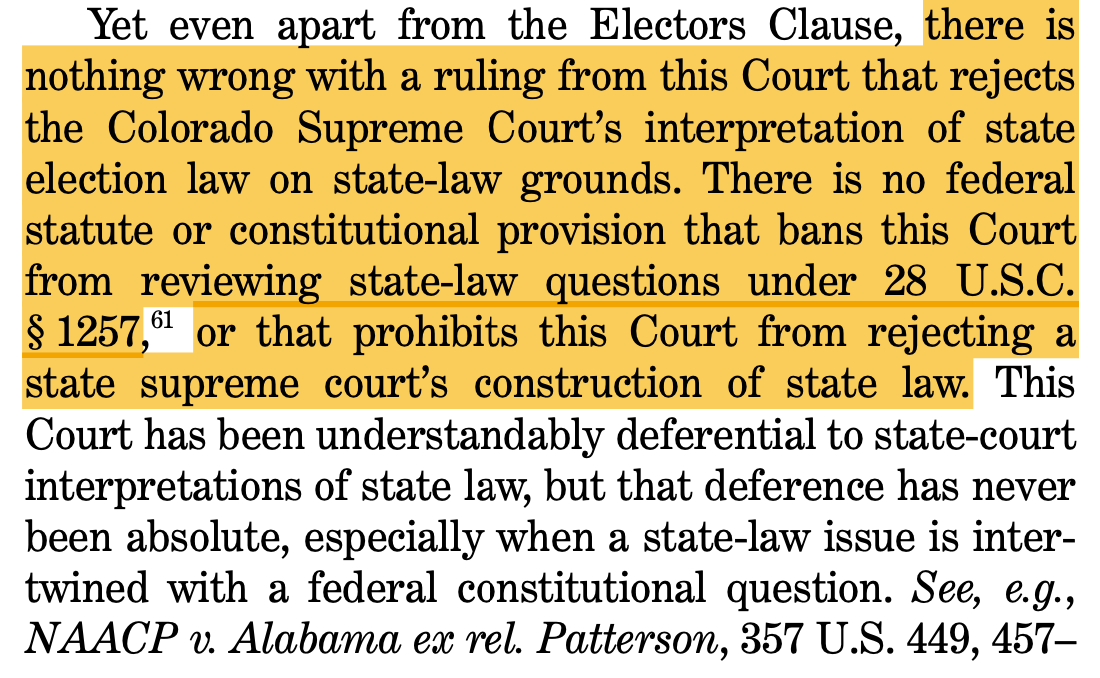Trump lawyers urge SCOTUS to ignore reality, state court ruling to keep Trump on the ballot
Jonathan Mitchell, the man behind Texas's S.B. 8 vigilante-enforcement abortion ban, is Trump's latest lead lawyer. In Thursday's filing, it showed.
Lawyers for Donald Trump on Thursday evening urged the U.S. Supreme Court to keep him on the ballot in his run for president.
Specifically, they asked the justices to reverse the Colorado Supreme Court’s decision that Section 3 of the Fourteenth Amendment bars Trump from being president because he engaged in insurrection and that Colorado law can serve as a basis for him to be removed from the ballot there.
Instead, the lawyers for the former president urged the justices to rule that Trump is not — and cannot be — barred from being president or appearing on the ballot on account of Section 3. In addition to arguing that Section 3 doesn’t apply to the presidency, the lawyers argue that Trump didn’t engage in insurrection.
As to the Colorado decision specifically, the lawyers argue that only Congress should be allowed to enforce Section 3, that Section 3 only limits holding office so therefore cannot be used to limit ballot access, and that Colorado’s courts got Colorado law wrong.
In addition to Thursday being the deadline for Trump’s brief in the case, it also was the deadline for amicus briefs — non-parties — supporting Trump or in support of neither party. As such, many pro-Trump briefs from Republicans and conservatives were filed, along with a handful of briefs in the latter category.
One of the briefs came from Michigan Secretary of State Jocelyn Benson, a Democrat, in support of neither party — and not taking a position on the underlying legal questions. She did, however, urge the court to act and resolve the Fourteenth Amendment questions.
"[I]t is not only necessary that this Court decide this matter quickly, but also vital that the Court address and resolve the issues related to § 3 as directly and fully as possible," Benson told the justices. “Without a swift conclusive determination regarding the applicability of § 3, the risk of confusion and disruption in the administration of elections will only grow.”
I’ll go into in more detail through each of the arguments once we get the responsive briefs — from the Colorado voters and secretary of state and those non-parties supporting the Colorado Supreme Court’s decision — on (or before) Jan. 31.
For now, I just wanted to note a few things that caught my attention about and in Trump’s brief.
The lead counsel for Trump is now Jonathan Mitchell, the former solicitor general for Texas and the man behind the state’s S.B. 8 vigilante-enforcement abortion ban. Mitchell has since worked as a private lawyer taking on many other ideological cases, including trying to stop PrEP and contraception coverage under the preventative care requirements of the Affordable Care Act and defending a public library sued for allegedly taking books off the shelves based on content, before joining Trump’s team in this case once it reached the U.S. Supreme Court.
Mitchell’s extremism certainly continued on Thursday. Many of the arguments made in Thursday’s brief are the same or similar to those that have been discussed and circulating over the past several months by those who oppose or disagree with the Section 3 argument. There were, however, two extreme arguments made by Mitchell and the other lawyers on Thursday that I want to highlight.
In one of the most significant portions of the brief, Mitchell and Trump’s other lawyers asked the court to ignore reality and rule that Trump did not “engage in insurrection” in violation of Section 3:
It’s not some semantic or technical argument even. Mitchell et al. argued to the U.S. Supreme Court that Trump was just “[c]alling for peace, patriotism, [and] respect for law and order” on January 6, 2021.
Does Mitchell think we are stupid? Or does he just think that a majority of the court will go along with this game of make-believe?
We have seen several arguments claiming that Trump did not “engage in insurrection” made in the months since the Section 3 case has been being broadly advanced, including in Thursday’s brief, but this “Trump as peacemaker” argument, specifically, is such an obviously bad-faith one that I was surprised to see it being advanced to the justices. But, here we are — and here Mitchell is.
Additionally, at the conclusion of the brief, Mitchell and the other lawyers told the U.S. Supreme Court that there is “nothing wrong” with it ignoring the Colorado Supreme Court’s interpretation of Colorado law if it thinks the state court got it wrong. And though the brief asserted that this is “especially” so when “intertwined” with a federal constitutional issue, it claimed that was not even necessary for such an act.
This is a shocking argument, as state courts are virtually always the last word on interpretation of state law. The Supreme Court only hears state court cases when there is a federal question raised. Even then, it generally will not hear those cases if there is an adequate and independent state ground for the decision.
Trump’s lawyers, though, argued in one brief paragraph on Thursday that the U.S. Supreme Court need not follow that path.
It is not, however, a new position for Mitchell (as was brought to my attention on Twitter/X). Mitchell wrote about this previously. In fact, in the 2010 article where Mitchell laid out this extreme argument, he admitted its extreme nature, writing that the idea that state courts have the last word on state law had reached “an almost natural-law status in our way of thinking.”
On Thursday, though, Mitchell was the former president’s lawyer, and he argued in the Supreme Court for Trump, in effect, that that “natural-law status” can and should be obliterated if a majority of the court so wishes.
Finally, and I do think it’s worth a brief mention, there was a moment where Trump’s lawyers soft-pedaled it a bit. Here are the five section headings — the arguments being advanced by Mitchell and the rest of Trump’s legal team. Which one looks different than the rest?
Spoiler: It’s Part III.
While the other four are conclusions that Mitchell and Trump’s other lawyers argued the Colorado court definitively got wrong — “is not,” “did not,” “cannot,” and “violated” — even Mitchell hedged with a “should” in this part. Instead of stating that Section 3 of the Fourteenth Amendment can only be enforced as Congress chooses, the brief asserted that there are “compelling reasons” why the court should rule that way.
While I think there are weaknesses throughout the arguments in the brief — and, as I explained earlier, I’ll go through the arguments in full once the responsive briefs are filed — I just wanted to highlight for now how even this extreme brief pulled back from the edge on that argument.










“Or does he just think that a majority of the court will go along with this game of make-believe?”
I mean, the Kennedy v Bremerton decision showed (again) that the majority doesn’t give a crap about facts.
Jonathan Mitchell is absolutely vile, and is also exactly the kind of person who has risen to the top in this era. Every possible warning light for this country is flashing desperately.